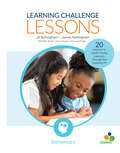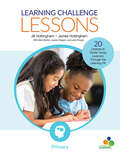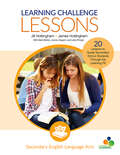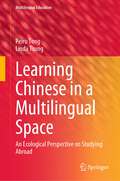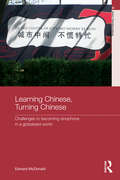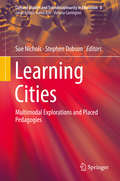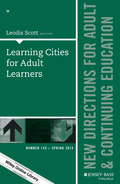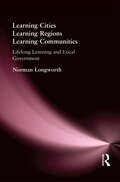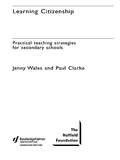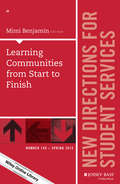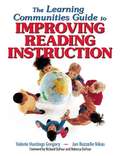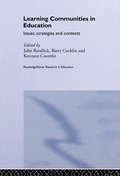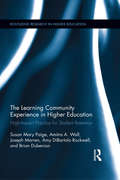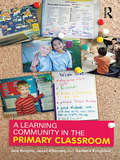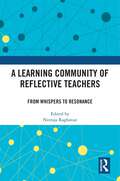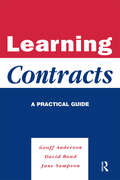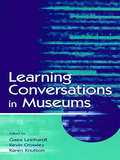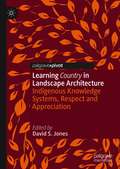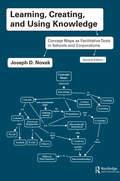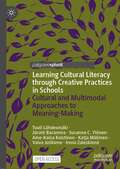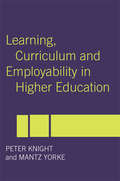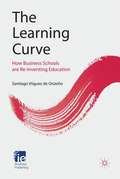- Table View
- List View
Learning Challenge Lessons, Elementary: 20 Lessons to Guide Young Learners Through the Learning Pit (Corwin Teaching Essentials Ser.)
by Jill Nottingham James NottinghamJumpstart meaningful learning for students with new Learning Challenge lessons Twenty new lessons, created to accompany The Learning Challenge, provide teachers with everything needed to run thoughtful, dialogue-driven challenges for elementary school students. Each compelling and developmentally-appropriate lesson invites young students to think, to be reasonable, to make moral decisions, and to understand another person’s point of view—all critical skills in today’s complex world. Detailed lesson plans help teachers facilitate rigorous discussion around topics of current importance and include activities and techniques that encourage students into the “Learning Pit” to explore ideas and uncertainties with others through dialogue.
Learning Challenge Lessons, Primary: 20 Lessons to Guide Young Learners Through the Learning Pit (Corwin Teaching Essentials)
by James A. Nottingham Jill NottinghamThe Learning Challenge Lessons have been created to accompany The Learning Challenge and provide teachers with everything they need to run thoughtful, dialogue-driven Challenges. The Learning Challenge Lessons, Primary, book includes 20 developmentally-appropriate lesson plans that will help young learners: • Learn new vocabulary in the context of dialogue • Challenge themselves to think through complex concepts • Encourage their natural curiosity and seek answers to questions they pose themselves
Learning Challenge Lessons, Primary: 20 Lessons to Guide Young Learners Through the Learning Pit (Corwin Teaching Essentials)
by James A. Nottingham Jill NottinghamCognitive conflict: Cognitive conflict is created when contradictions are identified and options are examined. It is the disagreement between two or more of the ideas or opinions a person holds concurrently. It is this conflict, or ‘wobble,’ that causes more reflection and the questioning of assumptions.Concepts: These are general ideas that group things together according to accepted characteristics.Construct: This is shorthand for Stage 3 of the Learning Challenge in which participants construct meaning by connecting, explaining, and examining patterns and relationships.Cumulative talk: This is talk that is characterised by repetitions, confirmations, and elaborations.Dialogue: Dialogue is conversation and enquiry. Dialogue combines the sociability of conversation with the skills of framing questions and constructing answers.Discussion: It is the action or process of talking about something and exchanging ideas.Disputational talk: This is talk that is critical of individuals (and their ideas), focuses on differences, is competitive, and is all about being seen to ‘win.’Enquiry: Enquiry is a process of questioning ideas, information, and assumptions and of augmenting knowledge, resolving doubt, or solving a problem.Eureka: Taken from the Greek word for ‘I found it,’ the eureka moment is reached as students climb out of the pit with a new sense of clarity and understanding.Exploratory talk: It is talk that is characterised by longer exchanges, use of questions, reflection, explanation, and speculation.Initiate-Response-Evaluate (IRE) model: Teachers use this most common pattern of classroom talk to ensure that pupils remember what they already know. This is not what we mean by dialogue.Knowledge: Knowledge is acquaintance with facts, truths, or principles. It is generally considered to be a step removed from understanding, which is when someone is able to relate, explain, and evaluate.Metacognition: Literally meaning ‘thinking about thinking,’ metacognition is an important part of dialogue. It encourages students to think about the way in which they are thinking, how they are using the strategies, and how they might improve for next time.Pit: This is a metaphor to identify the state of confusion a person feels when holding two or more conflicting thoughts or opinions in their mind at the same time.Reflection: This is giving serious thought or consideration to a thought, idea, or response.Skills: Skills are the abilities to carry out those processes necessary for gaining understanding, completing tasks or performing in any given context.Success criteria: Success criteria summarise the key steps or ingredients students need to accomplish the learning intention. They include the main things to do, include, or focus on.Understanding: This is the mental process of a person who comprehends. It includes an ability to explain cause, effect, and significance as well as to understand patterns and how they relate to each other.Wobble: This is a user-friendly term to describe a state of cognitive conflict.Zone of proximal development: This model by Lev Vygotsky describes the zone between actual and potential development.
Learning Challenge Lessons, Secondary English Language Arts: 20 Lessons to Guide Students Through the Learning Pit (Corwin Teaching Essentials)
by James A. Nottingham Jill NottinghamFans of the The Learning Challenge who want ready-to-use lessons for their secondary ELA classrooms need not look any further. This book provides teachers with everything they need to run dialogue-driven challenges so that students engage more deeply and develop literary skills critical to ELA standards. Students will analyze texts in lessons grounded in cognitive conflicts such as To be successful you cannot fail, but most successful people have experienced many failures along the way (Lesson 7: Was Jay Gatsby a success?) Love is impossible to define, and yet everyone knows what love is (Lesson 11: Is Romeo really in love?)
Learning Challenge Lessons, Secondary English Language Arts: 20 Lessons to Guide Students Through the Learning Pit (Corwin Teaching Essentials)
by James A. Nottingham Jill NottinghamFans of the The Learning Challenge who want ready-to-use lessons for their secondary ELA classrooms need not look any further. This book provides teachers with everything they need to run dialogue-driven challenges so that students engage more deeply and develop literary skills critical to ELA standards. Students will analyze texts in lessons grounded in cognitive conflicts such as To be successful you cannot fail, but most successful people have experienced many failures along the way (Lesson 7: Was Jay Gatsby a success?) Love is impossible to define, and yet everyone knows what love is (Lesson 11: Is Romeo really in love?)
Learning Chinese in a Multilingual Space: An Ecological Perspective on Studying Abroad (Multilingual Education #41)
by Peiru Tong Linda TsungThis book examines the benefits of an Australian in-country study (ICS) in China programme and explores ways to maximise the short-term ICS experience in a multilingual space. The book employs an ecological perspective which has seldom been used to examine the study abroad context. It emphasises the importance of the space itself as an arena of interaction, belonging and power, where conduct and modes of communication are often regulated by political authorities and societal expectations. Specifically, the book focuses on the following: • the extent to which the ICS facilitated interaction in different settings • the way in which interaction during ICS contributed to language learning • the degree in which the interaction during ICS contributed to culture learning and • the role of identity in the learning process in the ICS. The main argument of the book is that while the ICS promoted multilingual learning space for in-class and out-of-class interactions, which further facilitated language and culture learning to a great extent, Australian students’ identities and self-concepts also played a core mediating role throughout individual learning trajectories.
Learning Chinese, Turning Chinese: Challenges to Becoming Sinophone in a Globalised World (Asia's Transformations)
by Edward McDonaldIn this book Edward McDonald takes a fresh look at issues of language in Chinese studies. He takes the viewpoint of the university student of Chinese with the ultimate goal of becoming 'sinophone': that is, developing a fluency and facility at operating in Chinese-language contexts comparable to their own mother tongue. While the entry point for most potential sinophones is the Chinese language classroom, the kinds of "language" and "culture" on offer there are rarely questioned, and the links between the forms of the language and the situations in which they may be used are rarely drawn. The author’s explorations of Chinese studies illustrate the crucial link between becoming sinophone and developing a sinophone identity – learning Chinese and turning Chinese. Including chapters on: relating text to context in learning Chinese the social and political contexts of language learning myths about Chinese characters language reform and nationalism in modern China critical discourse analysis of popular culture ethnicity and identity in language learning. This book will be invaluable for all Chinese language students and teachers, and those with an interest in Chinese linguistics, linguistic anthropology, critical discourse analysis, and language education. Edward McDonald is currently Lecturer in Chinese at the University of Auckland, and has taught Chinese language, music, linguistics and semiotics at universities in Australia, China, and Singapore.
Learning Cities: Multimodal Explorations And Placed Pedagogies (Cultural Studies and Transdisciplinarity in Education #8)
by Stephen Dobson Sue NicholsThis book is an interdisciplinary text exploring the learning and educative potentials of cities and their spaces, including urban and suburban contexts, at all stages of life. Drawing on the insights of researchers from diverse fields, such as education, architecture, history, visual sociology, applied linguistics and sensory studies, this collection of papers develops and demonstrates the connection between experience, in all its dimensions, and informal learning in the city. The chapters discuss various sensory domains of experience, considering visual, embodied, and even sexual dimensions in relation to what and how learning operates, and the contributors reflect on their learning and inquiring experiences in the city, with special reference to topics such as narrativity, ‘race’ and ethnicity, equity, urban literacy, re-generation, participation, representation and oral histories.
Learning Cities for Adult Learners: New Directions for Adult and Continuing Education, Number 145 (J-B ACE Single Issue Adult & Continuing Education)
by Leodis ScottLearning cities call for a connection of adult education to elementary, secondary, and postsecondary institutions along with vocational and corporate workspaces. This volume considers how “learning cities for adult learners” could be created in America that promote lifelong learning and education. Encouraging a widespread approach to educate and learn across disciplines, within communities, and inside the minds of all people, topics covered include: • workplace and organizational learning, • community engagement and service learning, • public libraries and cooperative extension, and • leisure, recreation, and public health education.This is the 145th volume of the Jossey Bass series New Directions for Adult and Continuing Education. Noted for its depth of coverage, it explores issues of common interest to instructors, administrators, counselors, and policymakers in a broad range of education settings, such as colleges and universities, extension programs, businesses, libraries, and museums.
Learning Cities, Learning Regions, Learning Communities: Lifelong Learning and Local Government
by Norman LongworthThis book explores the mental and social landscape of the city of today and tomorrow; the way in which people think, interact, work together, learn and live with and among each other. Written to address the urgent need for a guide to the principles and practices of lifelong learning, the topics covered include: an introduction to the idea of learning cities policies and strategies for the learning city, including examples form around the world how to activate learning, involve stakeholders and encourage citizen participation in a learning city or region. Written by one of the world’s foremost thinkers in the field, this book is highly readable and easily accessible to anyone interested in the issues addressed. Workers in local, regional and national government, academics and students of lifelong learning, in addition to anyone with an interest in the future of cities and communities will find this a truly invaluable resource and guide to a way of thinking that many see as the way to a better tomorrow.
Learning Citizenship: Practical Teaching Strategies for Secondary Schools
by Paul Clarke Jenny WalesThe Citizenship curriculum aims to help young people to participate more fully in society through the development of a range of relevant skills and knowledge. This book shows how a variety of teaching strategies can be used to teach citizenship skills across a range of curriculum subjects as well as in Citizenship lessons themselves. Topics covered include: developing discussion thinking through debate addressing controversial issues investigating citizenship learning through role play working in groups learning with simulations participation. A lively and practical book which will be invaluable to student teachers and their trainers, Citizenship co-ordinators in schools and advisors across the country. It combines issues of pedagogy with real classroom experiences and demonstrates just how students learn from different teaching strategies.
Learning Communities from Start to Finish: New Directions for Student Services, Number 149 (J-B SS Single Issue Student Services)
by Mimi BenjaminWhile the phrase “learning communities” has various definitions, at the heart of all programs is the goal of enhancing the student learning experience in the community of others. This volume provides valuable information about learning communities--from start to finish--including: • historical and theoretical foundations that guide these programs, • structures of learning communities that provide varied opportunities for student participation, with a focus on specific student populations who may benefit from learning community experiences, and • elements of staffing and assessment, as well as an annotated bibliography of recent learning community literature. The authors consider critical elements of learning community programs and offer recommendations and options for faculty and staff who work with, or hope to work with, this particular curricular and cocurricular learning structure.This the 149th volume of this Jossey-Bass higher education quarterly series. An indispensable resource for vice presidents of student affairs, deans of students, student counselors, and other student services professionals, New Directions for Student Services offers guidelines and programs for aiding students in their total development: emotional, social, physical, and intellectual.
The Learning Communities Guide to Improving Reading Instruction
by Valerie Hastings Gregory Jan Rozzelle NikasThe themes of attending to individual needs, providing assessment-driven instruction, and creating long-term, focused professional development plans are solid and consistent throughout.
Learning Communities in Education (Routledge Research in Education #1)
by John Retallick Barry Cocklin Kennece CoombeLearning Communities in Education explores the theory and practice of learning communities from an international perspective. Covering primary/elementary, secondary and tertiary levels in a variety of educational contexts, leading researchers discuss:* theoretical issues and debate* processes and strategies for creating learning communities* learning communities in actionThe current experience of the learning community is examined with reference to case studies from England, Ireland, Canada, the USA and Australia. With comprehensive coverage of this much-debated topic and a careful balance between theoretical analysis and case-study material, Learning Communities in Education will be a valuable addition to the literature in this field.
The Learning Community Experience in Higher Education: High-Impact Practice for Student Retention (Routledge Research in Higher Education)
by Susan Mary Paige Amitra A Wall Joseph J Marren Brian Dubenion Amy RockwellOffering an interdisciplinary qualitative approach, this book examines and evaluates the role and benefits of a Learning Community (LC), a high-impact practice for student retention in higher education. Grounded in in-depth case studies and first-person student experiences, the authors studied four student cohorts (sophomore, junior, senior, and graduate students) who participated in a full immersion LC experience at an urban public four-year college in New York. Focusing on the maturity students develop as they progress toward their degrees, the authors evaluate the impact of the learning community on the students’ experiences, perceptions, successes and obstacles. A powerful demonstration of the effects of connection and comradery on learning, this account explores how the LC helps the decision-making of those in higher education administration regarding high impact student interventions.
A Learning Community in the Primary Classroom
by Jere Brophy Janet Alleman Barbara KnightonThis richly detailed description and analysis of exemplary teaching in the primary grades looks at how a teacher establishes her classroom as a collaborative learning community, how she plans curriculum and instruction that features powerful ideas and applications to life outside of school, and how, working within this context, she motivates her students to learn with a sense of purpose and thoughtful self-regulation. The supporting analyses, which ground the teacher’s practice in principles from curriculum and instruction, educational psychology, and related sources of relevant theory and research, are designed to allow teacher-readers to develop coherent understanding and appreciation of the subtleties of her practice and how they can be applied to their own practice. Resulting from a lengthy collaboration among an educational psychologist, a social studies educator, and a classroom teacher, the aspects and principles of good teaching this book details are widely applicable across elementary schools, across the curriculum, and across the primary grade levels. To help readers understand the principles and adapt them to their particular teaching situations, an Appendix provides reflection questions and application activities.
A Learning Community of Reflective Teachers: From Whispers to Resonance
by Neeraja RaghavanTeachers possess a wealth of untapped wisdom and valuable experience. Whether it’s in matter of educational policy, curriculum development or textbook selection, teachers carry a trove of information and insights to share. Traditionally, teacher development has been driven by administrators of schools, and it often takes the form of a ‘mentor’ teaching the staff of a school. But what happens when teachers across different locations collaborate and learn together? This volume documents such an initiative, sparked off by the Covid-19 pandemic, which brought people together online. It underscores the power of teachers debating, discussing, and learning from each other. Based on an Indian experience, the book addresses a range of issues teachers and educators face across the world — encompassing pedagogy, classroom management, school culture and teacher development. A unique story of community building and teacher education, this book also contains key outcomes and insights which take us through their action research projects and showcases a model of teacher development that can be adopted by interested readers. Above all, it brings out the crying need for a teacher’s voice to be heard — for far too long, teachers have been mere implementers of decisions taken by policy makers or managements of schools. By means of networking communities such as the one described in this book, the transformation of teachers going from whispers to resonance is greatly amplified. An important intervention in the domain of teacher development, this volume will be of great interest to students, researchers and practitioners of education, teacher education, and sociology of education. It will also be useful for teacher trainees, academicians, teacher educators, policymakers, schoolteachers, curriculum developers, teacher training institutes, and universities offering teacher education programs.
Learning Contracts: A Practical Guide
by Boud, David Anderson, Geoff Sampson, JaneLearning contracts have been a successful feature of many university/continuing education programmes over the last 20 years but many staff are still unfamiliar with them or have difficulty using them. This guide introduces the learning contract to those considering using them on their courses.
Learning Conversations in Museums
by Gaea Leinhardt Kevin Crowley Karen KnutsonWhat do people learn from visiting museums and how do they learn it? The editors approach this question by focusing on conversations as both the process and the outcome of museum learning. People do not come to museums to talk, but they often do talk. This talk can drift from discussions of managing the visit, to remembrances of family members and friends not present, to close analyses of particular objects or displays. This volume explores how these conversations reflect and change a visitor's identity, discipline-specific knowledge, and engagement with an informal learning environment that has been purposefully constructed by an almost invisible community of designers, planners, and educators. Fitting nicely into a small but rapidly expanding market, this book presents: *one of the first theoretically grounded set of studies on museum learning; *an explicit presentation of innovative and rich methodologies on learning in museums; *information on a variety of museums and subject matter; *a study on exhibitions, ranging from art to science content; *authors from the museum and the academic world; *a range of methods--from the analysis of diaries written to record museum visits, to studies of preservice teachers using pre- and post-museum visit tests; *an examination of visitors ranging from age 4-75 years of age, and from known and unknown sample populations; and *a lens that examines museum visits in a fine grained (1 second) or big picture (week, year long) way.
Learning Country in Landscape Architecture: Indigenous Knowledge Systems, Respect and Appreciation
by David S. JonesThis book strategically focuses upon the feasibility of positioning Indigenous Knowledge Systems into tertiary built environment education and research in Australia. Australian tertiary education has little engaged with Indigenous peoples and their Indigenous Knowledge Systems, and the respectful translation of their Indigenous Knowledge Systems into tertiary education learning. In contrast, while there has been a dearth of discussion and research on this topic pertaining to the tertiary sector, the secondary school sector has passionately pursued this topic. There is an uneasiness by the tertiary sector to engage in this realm, overwhelmed already by the imperatives of the Commonwealth’s ‘Closing the Gap’ initiative to advance Aboriginal and Torres Strait Islander tertiary education successes and appointments of Indigenous academics. As a consequence, the teaching of Indigenous Knowledge Systems relevant to professional disciplines, particularly landscape architecture where it is most apt, is overlooked and similarly little addressed in the relevant professional institute education accreditation standards.
Learning, Creating, and Using Knowledge: Concept Maps as Facilitative Tools in Schools and Corporations
by Joseph D. NovakThis fully revised and updated edition of Learning, Creating, and Using Knowledge recognizes that the future of economic well being in today's knowledge and information society rests upon the effectiveness of schools and corporations to empower their people to be more effective learners and knowledge creators. Novak’s pioneering theory of education presented in the first edition remains viable and useful. This new edition updates his theory for meaningful learning and autonomous knowledge building along with tools to make it operational ─ that is, concept maps, created with the use of CMapTools and the V diagram. The theory is easy to put into practice, since it includes resources to facilitate the process, especially concept maps, now optimised by CMapTools software. CMapTools software is highly intuitive and easy to use. People who have until now been reluctant to use the new technologies in their professional lives are will find this book particularly helpful. Learning, Creating, and Using Knowledge is essential reading for educators at all levels and corporate managers who seek to enhance worker productivity.
Learning Cultural Literacy through Creative Practices in Schools: Cultural and Multimodal Approaches to Meaning-Making
by Tuuli Lähdesmäki Jūratė Baranova Susanne C. Ylönen Aino-Kaisa Koistinen Katja Mäkinen Vaiva Juškiene Irena ZaleskieneThis open access book discusses how cultural literacy can be taught and learned through creative practices. It approaches cultural literacy as a dialogic social process based on learning and gaining knowledge through emphatic, tolerant, and inclusive interaction. The book focuses on meaning-making in children and young people’s visual and multimodal artefacts created by students aged 5–15 as an outcome of the Cultural Literacy Learning Programme implemented in schools in Cyprus, Germany, Israel, Lithuania, Spain, Portugal, and the UK. The lessons in the program address different social and cultural themes, ranging from one’s cultural attachments to being part of a community and engaging more broadly in society. The artefacts are explored through data-driven content analysis and self-reflexive and collaborative interpretation and discussed through multimodality and a sociocultural approach to children’s visual expression. This interdisciplinary volume draws on cultural studies, communication studies, art education, and educational sciences.
Learning, Curriculum and Employability in Higher Education
by Peter Knight Mantz YorkeHow can universities ensure that they are preparing their students for today's competitive job market?This book tackles the highly topical subject of graduate underemployment with insight and clarity. The authors argue the case for more sophisticated research into employability with passion and vision, discussing how employability-friendly curricula can be developed, even in subjects which have less obvious vocational relevance.The rapid growth of higher education over the past fifty years has seen expectations increase, and governments seeking to widen participation. There is now an urgent need for the Government and higher education institutions to address the issue of graduate employability. The authors of this timely book encourage a pro-active stance, offering a ground-breaking model that can be easily implemented in institutions to make low-cost, high-gain improvements to students' employability. Topics covered include:* The challenge of employability* The study and careers of English graduates* The enhancement of practice* Assessing employability* The Skills Plus project.Based on a set of over 200 in-depth interviews with recent graduates, this book forms a unique account of the meanings of employability in the workplace.
Learning Curve
by Sara Raziel Ilana PollackBrilliant Yehudis Tannenbaum aces her courses and is the class genius, pestered for help before every test. But is her brain all that anyone can see in her - even her good friend, Tova? Tormented by the English teacher's spelling mistakes and her own inexplicable difficulty with geometry, Yehudis stumbles through her first year in high school in the attempt to just fit in. It doesn't help that her lack of theatrical talent for the school play lands her in the costume department, and incredibly ends up getting her suspended from school! Learning Curve is a novel of self-awareness and friendship that will entertain as it captivates all the way to its surprising conclusion.
The Learning Curve
by Santiago Iniguez de OnzonoHow do you create world-class educational institutions that are academically rigorous and vocationally relevant? Are business schools the blueprint for institutions of the future, oran educational experiment gone wrong? This is thefirst title in a new series from IE Business School, IE Business Publishing .
